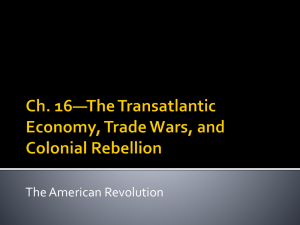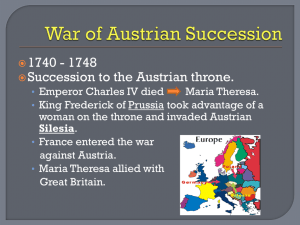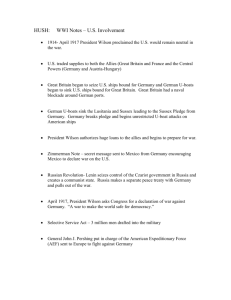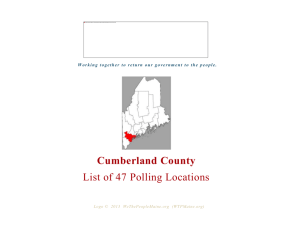EMPIRE AND WARS IN THE 18th CENTURY
advertisement
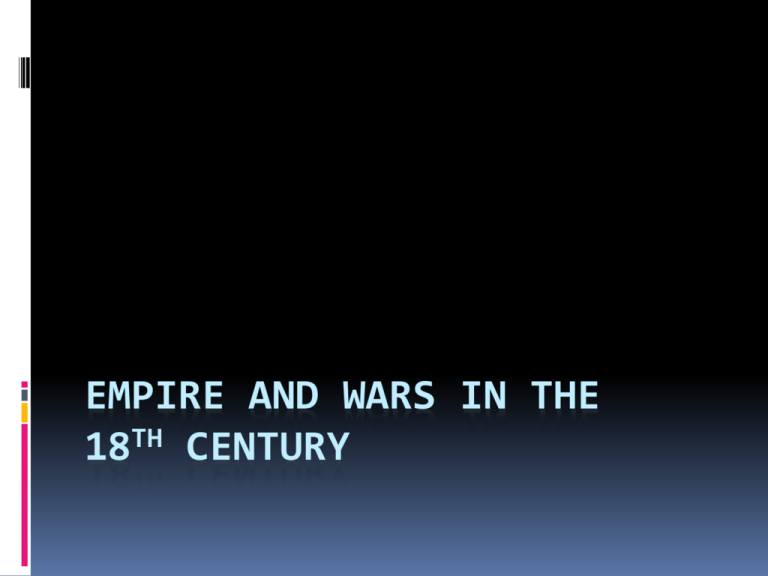
EMPIRE AND WARS IN THE 18TH CENTURY The Maritime Powers The Netherlands France Great Britain The Dutch Golden Age REPUBLIC – States General negotiated with the provinces RELIGIOUS TOLERATION Dutch Reformed Church was the official religion ECONOMIC PROSPERITY – agricultural advancements good trade colonies in the East Indies strong banking system The Dutch Decline After William of Orange’s death in 1702, there was no strong leader The British became the dominant naval power Fishing, ship building, and trade dominance declined FRANCE after Louis XIV Louis XV – 5 yrs old, Duke of Orleans made regent John Law – finance minister Mississippi Bubble Cardinal Fleury last priest/chief minister of France failed to bring peace and financial stability to France failed to train Louis XV ENGLAND: The Age of Walpole King George I (r. 1714-1727) Robert Walpole First Prime Minister (from 1721-1742) Dealt with the South Sea Bubble Said “Let sleeping dogs lie.” England – King George II (r. 1727-1760) WAR OF JENKINS’ EAR Begins 1739 Merges into the larger War of Austrian Succession/King George’s War War of Austrian Succession 1740-1748 EMPRESS MARIA THERESA Given the throne by the PRAGMATIC SANCTION Frederick the Great INVADES SILESIA December 1740 The Alliances AUSTRIA PRUSSIA Russia FRANCE Sweden Bavaria Denmark Spain GREAT BRITAIN Sardinia* The Netherlands Saxony* * = switched sides Battle of Fontenoy 1745 The last battle fought by the British Army during the War of the Austrian Succession. It was a decisive French victory, which opened the way for French conquest of most of Flanders before the war ended. British w/Dutch and Hanoverian allies were lead by the Duke of Cumberland, the son of King George II Fontenoy King George’s War 1744-48 French with Micmac and Abnaki allies vs. British with Mohawk allies Mostly raids and counterraids 1745- British capture Louisburg in Nova Scotia 1747-failed British attack on Montreal English and Spanish colonists also fought James Oglethorpe, proprietor of Georgia, invaded Florida but was ultimately unsuccessful King George’s War TREATY OF AIX-LA-CHAPELLE Ends the war Maria-Theresa keeps Austria, Hungary, Bohemia Frederick II gets Silesia Little is resolved between Britain and France in North America MEANWHILE IN ENGLAND . . . Charles Edward Stuart a.k.a. Bonnie Prince Charlie a.k.a. The Young Pretender - -Son of James III a.k.a. The Old Pretender -Lead a Jacobite uprising in 1745 The Forty-Five Bonnie Prince Charlie rallied support among the Highland clans of Scotland Defeated the British at the Battle of Prestonpans and threatened England The Duke of Cumberland was given command to stop the uprising British defeated them for good at the Battle of Culloden in 1746 Culloden Cumberland had nearly 10,000 men against 5,000 for Stuart The disciplined musketry of the English soldiers killed hundreds. The rebels were swept off the field, and Stuart barely escaped with his life. Casualties among the Scots numbered 2,000, while Cumberland lost only 300. Cumberland unleashed a reign of terror on Scotland that earned him the nickname of "Butcher." THE DIPLOMATIC REVOLUTION of 1756 France allies with Austria Britain allies with Prussia THE FRENCH AND INDIAN WAR a.k.a. THE SEVEN YEARS’WAR 1754 (1756)-1763 Begins in the colonies Starts in Europe when Frederick II invades Saxony Prussia, Britain vs. Austria, France, Russia, Sweden, Saxony William Pitt the Elder England vs. France in the colonies INDIA 1757 – The Black Hole of Calcutta 1757 – Robert Clive leads English to victory at Plassey NORTH AMERICA 1759 – General Wolfe leads successful attack on Quebec Treaty of Paris (1763) France ceded to England the territories of Canada, Nova Scotia, the Ohio Valley, and the lands east of the Mississippi River except the city of New Orleans. Spain traded Florida to England in exchange for Havana, Cuba (which England had captured during the war), but Spain had already received the territories west of the Mississippi. In the Caribbean, France regained Martinique and Guadeloupe, but most of the rest of the non-Spanish Antilles went to Britain. In India, the British East India Company assumed total control of Bengal, and limits were set on French military power in its remaining territory on the Coromandel Coast and in Pondicherry. SIGNIFICANCE: Growth of national identities for Britain and France Prussian army showed its strength, survived threats from Russia England demonstrated the dominance of its navy British and French economies weakened MEANWHILE IN ENGLAND . . . JOHN WILKES Pamphlet supporting Wilkes

